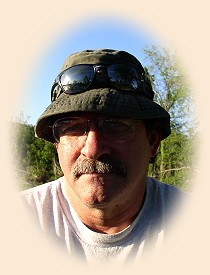|
My recent successful trip using a Parachute Adams dry
fly on panfish led me back to the same lake a week later
for another dose of feel-good medicine. This time, though,
the 'gillies, crappie and bass pretty much ignored my PA
even though I fished it the same fashion, and in the same
places, as I'd done earlier.
I suspect their disinterest was related to a 3-inch rain
a couple of days earlier that put a foot of new water in
the lake. As a result of this storm inflow, the weedbeds
I normally fish the edges of were still present and in the
same places, but were now totally submerged. Result? Fish
were still lurking at the weedbed edges, using those edges
as ambush points, except now they also had a foot of water
above the beds in which to hunt prey. For them, their habitat
of choice had become a "super weed bed." Indeed, I could see
surface and near-surface feeding activity going on all around
me as I anchored and began casting. This was going to be fun!
But for reasons known only to the fish, they were simply
not enthused about a mayfly-imitating Parachute Adams.
Maybe they were burned out on mayflies after gorging on
thousands of real ones just before the storm? Whatever,
after working the PA for thirty minutes and getting very
few hits I clipped it off, tied on a small Yager's cork
popper and gave it the old heave-ho.
It didn't matter where I threw it, that popper was definitely
the ticket. Just guessing, but those little gurgling sounds
a popper makes as it twitches through the water were exactly
what the fish required in order to locate my offering. The
water clarity may have been stained just enough that they
couldn't readily see a Parachute Adams, and it's understandable
why they couldn't hear a PA coming, due to its design. But
they could hear a popper gurgling somewhere nearby and rapidly
close on it employing their lateral line direction-finding
equipment.
Little bass were what I began catching the most, bass about
8-to-10 inches long. There seemed to be no end to them.
This was fun, of course. What always interests me more,
though, is bluegills and crappie. So I left the weedbed I
started at and moved over to a shoreline area where the water
was shallower. Maybe the storm surge had put the 'gills up
against the bank?
Some were there, but not many. Or, if they were there
maybe they didn't like seeing a popper and wanted a mayfly
imitator instead. But I had a popper tied to my leader now
and it was starting to get along toward dusk - no time to
start switching flies every few minutes; you lose too much
fishing time fussing with knots in the dim light.
I abandoned the shoreline place, paddled silently into the
mouth of a nearby feeder creek and anchored in a spot that
let me throw left into a 120 square foot pocket that lies
underneath the limb of a sycamore tree that stands out over
the lake. Not long ago, I'd tossed a little Yager's popper
into this unremarkable-looking spot about 50 times and caught
nearly 40 keeper-size bluegills.
The popper landed and I held my breath, anticipating the same
instantaneous assault that had happened prior. Twenty casts
later, my face was turning a dangerous shade of blue from
holding my breath so much.
"Well, they're obviously not here, either - or if they are,
they don't like this popper anymore," I told myself, "so you
better do something fast."
"Right!" myself agreed, "Let's try that next spot up the
creek channel where we ripped into 'em a few other times
before."
Hauling up and then cam-locking my soft bag anchors, I crept
my canoe about 30 feet forward, re-anchored and began casting
to an area along the left bank where I knew the water dropped
off from 1 foot down to about 4 feet. There was a submerged
weedbed here I knew.
It was now getting almost too dark to make out the popper;
its location could be determined only by reflections from
the little waves it generated every time I twitched it. The
popper started getting hit on by a fish that was trying but
missing. Three or four casts I shot back into the same zone,
trying to inspire this little pretender, when something finally
grabbed the popper for real.
I lifted my 3-wt., the rod bucked down sharply, line got pulled
involuntarily from my hand and...WHOA...this ain't no bluegill!
Glancing at the floor of my canoe to assess my stripped line
status, I saw no loop knots or knee pin-downs that would
interfere with a sudden hard run by the fish, and felt
confident that I was as ready as I'd ever be for a knockdown,
drag-out battle with a lunker channel cat. Because the way
this fish was keeping down and surging strong, this had to
be a big channel cat.
One advantage I felt was in my favor was the underwater
terrain. This feeder creek channel is narrow enough that
a big fish can't move laterally very far either direction.
It can swim up the channel a ways but not very far before
running into shallow water. Same thing if it swims back
past me trying to escape into the lake; there's a mud bar
"barrier reef" that the fish has to cross. I learned long
ago that once hooked, most big fish hate feeling the bottom
rub against their stomachs; they will do anything to avoid
getting pulled aground.
As a result of this terrain advantage, then, the fight would
be restricted to a 500 square foot area. I just might have
a chance to catch this catfish. Mentally I dug in, trying
to stay relaxed and alert to any sudden movements made by
the fish. You don't want to be a "haul it in hero" in a
situation like this.
About five minutes went by with no glimpse of the fish
when finally it rose and I caught my first look. Big
overlapping scales. Damn, a carp. But was it? A few
seconds later I got a brief look at its head; a
torpedo-shaped noggin with a small oval-shaped mouth
resembled the eating end of a grotesquely overgrown
creek chub.
Well, isn't this marvelous? The most productive panfishing
time slot in the whole evening is getting wasted in a
protracted fight with...an Asian grass carp.
As I began learning the hard way, a grass carp has got
a lot of gas in its tank. This fish swam alongside my
canoe many times in a way that made me think it was
whipped, only to burst away again and again on powerful
runs. Not surprising, I suppose, for a carp variant
some 3-feet long. But when all I could do between those
runs was sit there with rod in hand contemplating my navel
while the fish stubbornly resisted coming in, the whole
thing soon became a bit annoying. I finally lost patience
and decided to force the issue by putting maximum pressure
on the fish, trying to lead it to hand.
Once the fish came in, though, I discovered there wasn't
anywhere on its body I could get a secure hold on. And
truth be told, I didn't want the huge beast inside my
canoe anyway for fear it might bust up some of my gear
thrashing about. So when its tiny mouth finally came
within range I reached down, grabbed Yager's popper and
tried a quick push into the mouth, hoping the hook barb
would pop out. It didn't: what happened instead was the
popper's cork body disintegrated in my hand, leaving the
hook stuck in the mouth of this again rapidly-disappearing
Moby Dick.
Aw, what the hell; I yanked back, broke my leader and the
fish and I were finally free at last, free at last.
The fight had devoured so much time that it was almost
dark now. Which wouldn't have been bad except mosquitoes
were humming around me earnestly searching for any square
centimeter of skin or clothing I might have missed with my
repellent applicator. And you always miss something...
This encounter was my first inkling that Asian grass carp
are present in this lake. I don't know how many are there,
or whether to be happy about it or not. I guess my feelings
on the subject are irrelevant; they're here. I just hope
I don't hook up with any more of them. ~ Joe
About Joe:
 From Baldwin City, Kansas, Joe is a former municipal and
federal police officer. In addition to fishing, he hunts
upland birds and waterfowl, and for the last 15 years
has pursued the sport of solo canoeing. On the nearby
Kansas River he has now logged nearly 5,000 river miles
while doing some 400 wilderness style canoe camping
trips. A musician/singer/songwriter as well, Joe's
'day job' is with the U.S. General Services Adminstration.
From Baldwin City, Kansas, Joe is a former municipal and
federal police officer. In addition to fishing, he hunts
upland birds and waterfowl, and for the last 15 years
has pursued the sport of solo canoeing. On the nearby
Kansas River he has now logged nearly 5,000 river miles
while doing some 400 wilderness style canoe camping
trips. A musician/singer/songwriter as well, Joe's
'day job' is with the U.S. General Services Adminstration.
Joe at one time was a freelance photojournalist who wrote the
Sunday Outdoors column for his city newspaper. Outdoor
sports, writing and music have never earned him any money,
but remain priceless activities essential to surviving the
'day job.'
|

 From Baldwin City, Kansas, Joe is a former municipal and
federal police officer. In addition to fishing, he hunts
upland birds and waterfowl, and for the last 15 years
has pursued the sport of solo canoeing. On the nearby
Kansas River he has now logged nearly 5,000 river miles
while doing some 400 wilderness style canoe camping
trips. A musician/singer/songwriter as well, Joe's
'day job' is with the U.S. General Services Adminstration.
From Baldwin City, Kansas, Joe is a former municipal and
federal police officer. In addition to fishing, he hunts
upland birds and waterfowl, and for the last 15 years
has pursued the sport of solo canoeing. On the nearby
Kansas River he has now logged nearly 5,000 river miles
while doing some 400 wilderness style canoe camping
trips. A musician/singer/songwriter as well, Joe's
'day job' is with the U.S. General Services Adminstration.